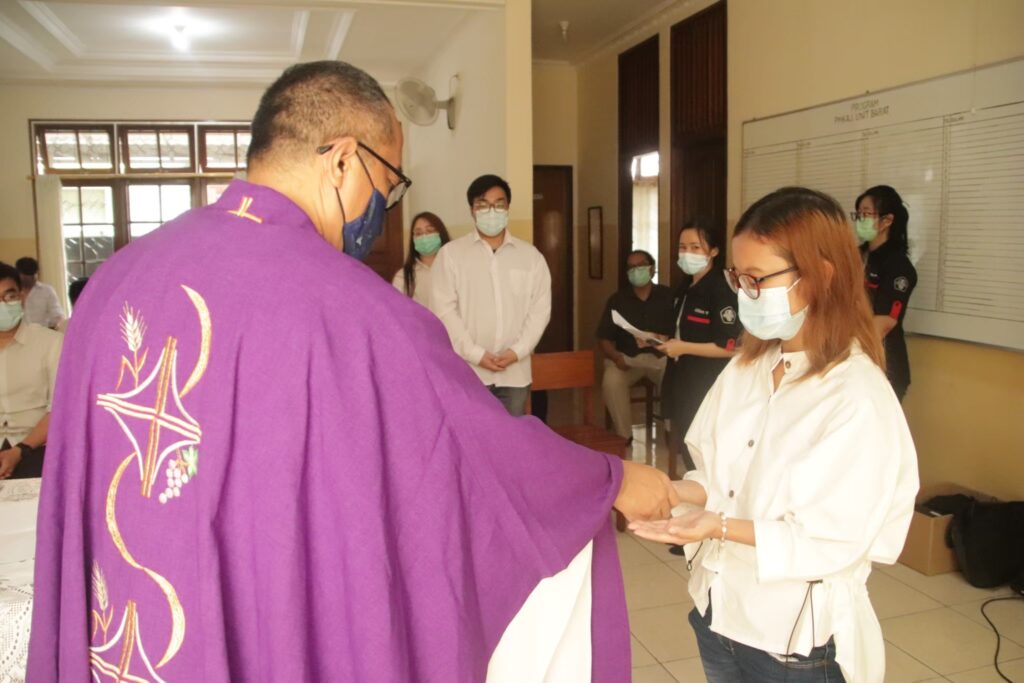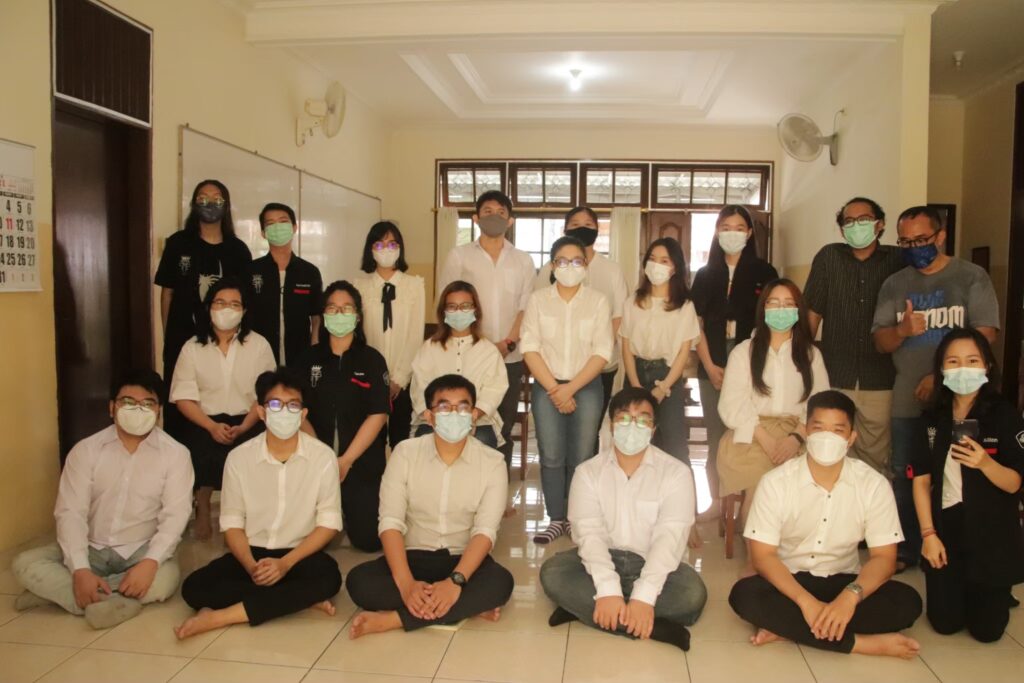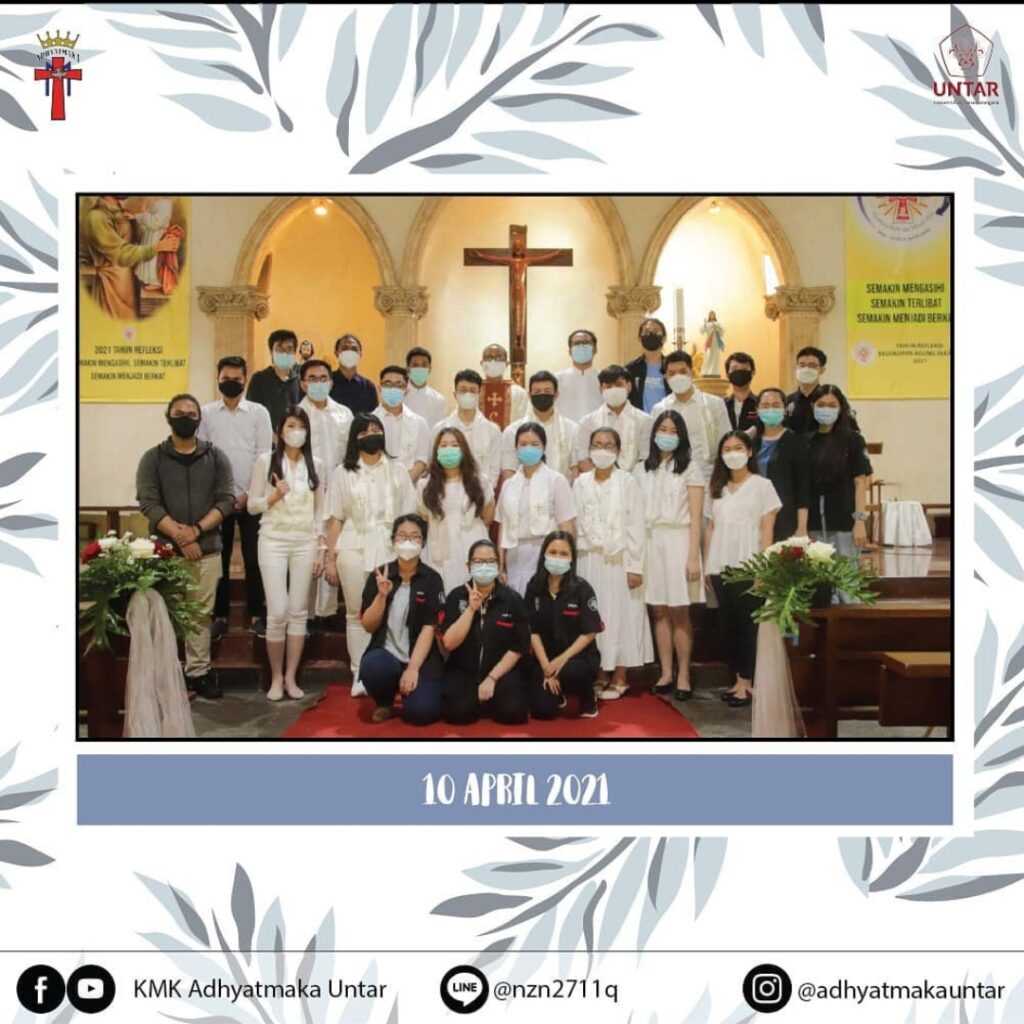Bear Fruit in Faith: A Meaningful Experience of Conversion
10 April 2024 | Aurea Gita (Indonesia) | Our thanks from the Xaverian Missionaries in the Philippines
Embracing a new faith is a profound and deeply personal journey, often triggered by significant life events or deep realizations. For many raised in the Islamic tradition, the path to conversion to Catholicism begins with introspection, questioning, and a search for spiritual fulfillment. This transformative process is driven by personal experiences that challenge long-held beliefs and lead to a deep connection with the teachings and traditions of the Catholic Church.
I take this reflection from the experience of a Catholic who used to be a devout Muslim. Her desire to convert to Catholicism was accompanied by various challenges and a mystical experience of encountering Jesus Christ. I was shocked by her story, even thinking that maybe God was revealing Himself to me by saying that the conversion happened because of His will alone and not because of missionary efforts alone. I learned from her experience, allowed myself to be open to interesting stories from others, and finally humbly walked with God. So, I dedicate this reflection to Aurea Gita, a faith warrior whose story is worth pondering. I met her while accompanying her during her catechumenate, and on this occasion, I had the opportunity to explore her story through a simple interview. The hope is that this experience will be a good reflection for us Christians and for people who are still confused about their path of faith. [NB: This article is the result of my interview with Aurea Gita, narrated with some additional expressions, and has been approved by her through corrections and re-reading of this reflection.
– Bro. Michael Thimoty, SX.
My Story of Conversion: Aurea Gita
My name is Aurea Gita. I was baptized as a Catholic in 2021. At that time, I felt grateful for the baptism I had received, mainly thanks to the path that God gave me. If you look at my faith journey, I will start from college. Before becoming a Catholic, I was a devout Muslim. I was called to study religion in 2015–2016 while studying social science. At that time, I wanted to explore some religions other than Islam, and my friend, who was a Catholic, answered this curiosity. I asked my friend about Catholic teachings and was invited to a Christmas mass. Please note that at that time, my faith in Islam was still powerful: I was diligent in my worship (praying, reciting the Quran, etc.). Christmas mass was not enough for me to understand Catholicism, so my friend helped me by explaining the life of a Catholic, one of which I remember was when he explained about Trinity. I had many debates with my friend, and the conclusion I could draw at that time was that I was not interested in Catholicism. The reason was that I felt that the teachings of Catholicism were very different from the teachings of Islam, and certainly, the teachings of Catholicism were not compatible with my own heart.
Aurea Gita (Period of Cathecumenate)
As time went by, for about two years (2016–2018), I remained focused on my worship as a Muslim. In 2018, there was a moment that disturbed me. At that time, I felt empty and hollow. I didn’t know why I was experiencing this, even though I was faithful to my prayers. Along with that emptiness, I was faced with a family problem where my father had an affair with another woman and decided to remarry. I was quite depressed, and at that time, I tried diligently to pray tahajjud[1], pray istikhara[2], pray hajat[3], read the Quran; however, I still felt no change. In the emptiness of my heart, I got an unexpected insight.
At that moment, I was playing with Instagram, and it just so happened that many Scripture verses appeared on my Instagram homepage. I remember very well that one verse in the Bible touched my heart: “Ask and it will be given to you, seek and you will find, knock and the door will be opened to you.” At that moment, I immediately thought, and perhaps joked a little to myself, “Then, if I ask for something, will it be granted by God or not?” The first request was for me to graduate with a bachelor of social science. In this case, I was chasing the deadline for submitting my thesis so that I could hold my graduation. I, who had lost hope in pursuing it, became more enthusiastic and believed in God’s work. And thanks to God, in more or less one day, I had completed my delayed thesis. I believe that God worked in the completion of the thesis. After that experience, I once more boldly reasoned, “If God grants this, surely He will also grant the big things!” My request was that my family be given a good solution, especially for my father, and also healing for my depression. Thanks to God, I experienced peace in my heart, and slowly, my family problems diminished. From that simple verse, my heart was opened to know Jesus and his teachings. However, I didn’t dare to express it openly and chose to relearn the Catholic teachings that I had left behind.
In 2020, I wanted to convert to Christianity. With the experience I had, I then asked my friend, who had introduced me to Catholicism, that I tried to convert. My friend was shocked because, at that moment, I rarely had contact with him, and at the same time, I asked for help to convert to Christianity. I was confused and asked my friend which was better, Protestant or Catholic. Then, my friend suggested converting to Catholicism, and I accepted. So, at that time, I was helped to enter the catechumens at Tarumanegara University, Jakarta. I faced a challenge, which was my parents’ signature. One of the requirements for admission to the catechumenate is parental consent. I didn’t dare to express my desire to convert to Catholicism to my parents. So, I lied to them, saying that I just wanted to learn Catholicism. Eventually, I got the signature.
The batch of Aurea Gita (First Initiation to the Catechumenate)
Over time, especially during my catechumenate years, my parents became suspicious of my reasons for studying Catholicism. When it became clear that I wanted to convert to Catholicism, problems began to arise, especially in my relationship with my family—that moment happened when I returned to my hometown in Kebumen, Central Java Province. The masters (in Arabic Haji) [4], confronted my brother and me which my parents were also part of. Then, one of the masters asked me, “Do you really want to apostatize (convert to Catholicism)?” Then, I answered “yes” because of my previous experiences. They were three, as I remember, and one haji gave me a very hurtful answer, “Instead of you apostatizing now, it would be better for you to be killed when you were in your mother’s womb!” Not only that, but I was also quenched (in Arabic: ruqyah[5]) twice. In Islam, if an evil spirit possesses a person, the person must be ruqyah so that the evil spirit leaves the person. The signs that the ruqyah is successful are that the person experiences vomiting or some other adverse reaction to the influence of the evil spirit. In this way, the masters who performed the ruqyah on me hoped that the evil spirits influencing me to convert to Catholicism would be expelled. Miraculously, I did not experience any of these adverse reactions! Why was that? All I did at the time they performed the ruqyah was to pray the Our Father and the Hail Mary. Those were the only prayers I had to rely on for strength while being ruqyah. Immediately after the prayers, one master said that I had a great power that protected me from their prayers. Later, I told my friend about this experience, and she said that perhaps the Holy Spirit was my shield at that moment.
After the ruqyah, I had a mystical experience that touched me deeply. I dreamt at night, that I was in a place where I was surrounded by hajis who were doing the ruqyah to me. Among them, a demon was bothering me and wanted to pull me to join the hajis. However, in that fearful situation, suddenly, a white light struck the demon very quickly. After that, I woke up from my dream, and I still felt terrified about the dream I had. However, I saw that to my left was the devil and in front of me was Jesus Christ. The light in front of my eyes was dazzling, and then it was as if Jesus said to me, “Don’t be afraid, my child.” It was then that the demon on my left squirmed and left me. That moment made me feel calm.
Receiving the Sacrament of Baptism, Confirmation and Eucharist (April 10, 2021; doc: Instagram @kmkadhyatmaka)
To cut the long story short, I struggled with my faith to convert to Catholicism, and I was finally baptized in 2021. The journey to this baptism was not easy for me. Not only was there the prohibition of my parents, but also the challenging catechumenate process. From learning Arabic and all those Islamic concepts that I had learned, I now had to explore new ideas about Catholicism. On the other hand, my baptism was also unknown to my parents, especially my mother. It took time for my mother to accept the fact that I had become Catholic. It happened when I was in the hospital, and it was discovered that I had bipolar disorder. In that state, I told my mother that I was distressed by their rejection of my new faith. I said that I wanted to pray quietly and live my faith as Catholic. My mother was shocked because she thought the ruqyah had worked, but it had not. My mother was still rejecting my choice, but my father accepted it, believing I should take responsibility for it. It took time for my mother to accept it, and sometimes my friends are also surprised by my choice to become a Catholic. One friend even offered me to go to an Islamic boarding school and meet with an ustad [6], in the hope that I could return to Islam. Still, I keep my faith in Jesus Christ.
As a Catholic, I had new experiences that helped me to pray more fervently. Personal encounters with Jesus in the Eucharist helped me to grow in faith. I also lived in a church-based environment and made many new friends who helped me develop my faith. I feel grateful for the experiences that have happened in my life. The presence of the Lord Jesus accompanies my life. Thank you.
WORD(s)
[1] In Islam, Tahajjud prayer is a nafl, or voluntary prayer. It is a night prayer offered to attain mental strength and peace and to avert acts of sin.
[2] According to Ibn Hajr, Istikharah is a word that means asking Allah to help the person make a choice, meaning choosing the best of two options.
[3] In Islam, Solat Hajat is a Sunni prayer of two raka’at (in Arabic: bow; simply defined as bowing. This is the manner of prayer in Islam, and in praying five times a day, in Islamic law, the number of raka’at is also calculated.)performed to seek help from Allah s.w.t. that what is prayed or sought for will be accepted and realized. Whoever has a “Hajat” (need) from Allah or any of His creation, let him perform wudhu’ (ablution) and pray two raka’at.
[4] In English, there is no specific title for these masters [translation for the term Haji. Haji is the person who had already perfomed the duty of pilgrimage to Mecca].
[5] Ruqyah in Islam is the recitation of the Qur’an, seeking refuge in Allah, remembrance, and supplications used to treat sicknesses, magic, witchcraft, and other problems.
[6] The term Ustadh is derived from the Arabic word “ustad,” which means teacher or master. In Islamic tradition, the Ustadh is a highly respected figure who is knowledgeable in Islamic theology, jurisprudence, and history, and who imparts this knowledge to his students.




